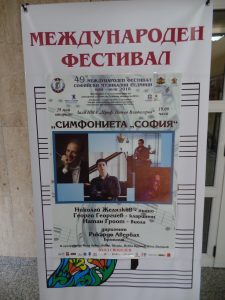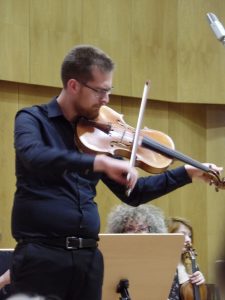By Nathan Groot
In writing this retrospective, I want to make clear and acknowledge that any observations I make about Bulgaria or Bulgarian culture come from an extremely limited experience of only ten days in a small area of Sofia. It is impossible to make any kinds of comprehensive statements based on such a limited experience. My observations will be based only on my own experience with the city, the music in Sofia, and the Bulgarian people I met and interacted with.
Because of my limited knowledge of Bulgaria going in, I did not have a lot of preconceptions about the country before the trip. Before my flight, I read about its history, made a list of popular tourist sites, and tried to fill my knowledge gap a little but, by no means, felt “caught up” when it was time to go. No online pictures or tourist reviews could have prepared me for how beautiful the city really is. On my drive from the airport, which bypassed the city center, I was immediately struck by how green the city is. Parks seem to be plentiful and most areas of the city have plenty of areas for trees and foliage to grow. In many of the parks, there are beautiful flowerbeds that sometimes, when accompanied by a tulip-shaped plaque, signify collaboration between the Netherlands and Bulgaria. Vitosha Mountain, which was directly behind my hotel to the south, and the other surrounding mountains reminded me of my childhood home near the edge of the Appalachian Mountains in Tennessee.
The metro subway system is very new and, even to a non-Bulgarian speaking person, was very easy to use. The stations were modern and very clean. The taxi service was also very easy to use after I learned the trick to hailing the right taxis. When I had time off, especially after the performance, I was able to explore the city on foot. Sofia has a lot of beautiful areas that are walking only, like a wide-open walking area outside the National Palace of Culture that has an impressive line of fountains, and a walking main street which leads from the National Palace of Culture to the Cathedral Church of Sveta Nedelya and is lined with restaurants and shops. The city center is full of beautiful and interesting buildings- some of which are well over a thousand years old. The center of Sofia is so beautiful and has so many sites to see that I returned to it repeatedly throughout my trip, even up until the last day.
In my short experience in Sofia, I did not meet anyone with an American accent except for the professors from the Havighurst Center. Of the tourists I came across while exploring, most spoke Italian, French, or Dutch. There were a few people from English speaking countries, like some players from an Australian football team that stayed in our hotel, but most of the people I heard on the street were Bulgarian. There is certainly nothing wrong with a country capitalizing on tourism but I was a little relieved that Sofia is at least a little less “touristy” than some other European cities might be.
The Bulgarian people that I met were friendly, kind, and generous. They were so consistently hospitable that I have to assume that there must be some kind of very culturally engrained “Bulgarian manners.” I don’t have any evidence for this other than my experience. The most obvious case for this is two things that happened at every restaurant dinner. The first thing is that, when the food arrives, all of the Bulgarians at the table offer the food on their plate to others at the table. This happened without exception at the dinners I attended. Most people also continue to insist that you have more as the meal progresses. I always got the impression that it would be rude not to accept so, at the end of every meal, I had part of everyone’s entrée. I don’t know if this is the practice for everyone or just the people who I had dinner with. The second thing that happened at every dinner was, when the check arrived, everyone at the table fought to pay it. The server always brought one check for the whole table- apparently “going dutch” is not common in Bulgaria. Sometimes, the argument for who would pay went on for up to five or ten minutes.
When having conversations, I noticed that everyone seemed to be especially engaged and willing to talk for long periods of time. After rehearsals, musicians stood and talked for the entire break. Even though I didn’t speak the language, a lot of the musicians who knew some English were interested in having long conversations with me.
The main grocery store, Billa, an Austrian company, is much smaller and contains less processed foods than most American grocery stores. It does, however, have a lot of fresh and locally produced food. Bulgaria’s obesity rate is less than half of the United States’ obesity rate. Part of this might be the size of the country but, at least from what I observed, people tend to focus more on fitness and a balanced diet than people do on average in the US.
Bulgaria seems to have a rich and vibrant musical tradition. On my first day in Bulgaria, I attended an outdoor concert that celebrated the Culture and Literacy Day. The audience was large and enthusiastic. As the ensemble played folk music on Bulgarian instruments, members from the crowd rushed to the front of the stage to dance, even though the pulse of the music would seem irregular to people from more western cultures. The enthusiasm and shared experience around folk music was extremely strong.
This experience was a culture shock for two reasons: it was my first time out of the United States and it was my first extended stay in a major city. I have never lived in a city with a population of more than thirty-thousand. If/ when I return to Bulgaria, I want to take time before the trip to learn enough Bulgarian to communicate. This time, although I intended to learn more, I only knew greetings like “good morning, good day, and good evening,” often with questionable pronunciation (most people who I greeted verbally correctly guessed that I was American). In addition to the struggle that the language barrier causes in day-to-day transactions, it also caused me to miss out on some conversations with very interesting people. During the trip, I spent many conversations and even whole days when almost no English was spoken. Sometimes, not knowing the language got a little tedious but, when I remembered to stay vigilant and attentive despite the barrier, I could sometimes still keep very rough track of the conversation. I wasn’t able to track the content of the conversations, although there were some clues (like some proper nouns), but the very basics, like question and answer or sentences said sadly, excitedly, or in surprise, allowed me to follow the general structure of conversations. It was less like listening to a conversation and more like just observing communication. Even though that process was interesting, I would still like to learn Bulgarian for my next visit.
I began working on Professor Krushev’s piece in January of this year. In March, Professor Yovcho Krushev came to Miami University to perform Beethoven’s Piano Concerto No. 1 with the Miami University Symphony Orchestra and to have Miami students perform his works on a concert, organized by the Department of Music and the Havighurst Center, called Voices from the Balkans: A Recital of Bulgarian Music. Sonata-Elegy was the tenth and last piece on the program. Professor Krushev performed piano with the student performers on most pieces. In the month leading up to the performance, Professor Mary Harris guided me in learning the piece so that I was prepared for Professor Krushev’s arrival. In my rehearsals with Professor Krushev, he encouraged me to play more boldly and gave me invaluable insight into his compositional intent. In writing the different sections, he intended for the viola to emulate different string instruments. In the Maestoso tempo moderato, the viola is meant to sound like a cello. In this part, he instructed me to play with as deep and rich a sound as possible. In the orchestral arrangement of the piece, the viola double the cellos in this section. Later, in the allegro and allegro agitato sections, the viola is meant to sound more like a violin and is given a more virtuosic line in a higher register.
The performance at Miami University went very well and I was given the opportunity to perform the piece in Sofia. There were two challenges in Sofia that were not factors in March. One was that I was performing from memory and the second was that I was performing with an orchestra. As a violist, it is extremely hard to be heard over an orchestra and it was even more important for me to take Professor Krushev’s advice to “play boldly.” I knew that I am sometimes prone to memory slips, so I took care to work on memorization relentlessly as soon as I found out that the trip was going ahead. Thankfully, that work paid off and I did not have a memory slip in the performance.
In several sessions between rehearsals, I played the piece for Dr. Averbach and got extremely helpful feedback- especially on tricky transitions and the cadenza. I also found that playing while he conducted the score was very helpful in preparing me to play with the orchestra.
While learning the piece, I listened to the one recording of the piece on YouTube with orchestra- the premier with Ognyan Konstantinov. On the day of the performance, I had a lesson with Professor Konstantinov. He graciously acknowledged that, because it was the day of the performance, it would be unwise to change any bowings or fingerings. I wrote the ideas he gave me for bowing and fingerings in part for future use. The main point that I took from the lesson was to again, play boldly, without backing off in intensity, but to still play with dynamic range and sensitivity. I think those ideas that mirrored Professor Krushev’s instructions from March helped me in my performance.
When I wasn’t performing or exploring the city, I was with or under the instructions of Dr. Averbach working on making connections with other musicians in Sofia. While not all the efforts to meet with people worked out, I was still able to make a lot of connections with other musicians- all of whom are listed in the journal below.
This trip was an experience of a lifetime. I met so many amazing people and had a wonderful time performing with the musicians in Bulgaria. Thank you again to all who made it possible.
Acknowledgements
This trip would not have been possible without funding from the Havighurst Center for Russian and Post-Soviet Studies and the Miami University Department of Music. I am extremely grateful for their support in making this experience possible. I am also extremely thankful to Dr. Ricardo Averbach for doing so much work organizing the trip, managing my itinerary, and helping me make connections in Sofia. Thank you to Professor Yovcho Krushev for allowing me to play his wonderful piece, Sonata-Elegy for Viola and String Orchestra, and for being absolutely fantastic to work with when we performed the piece together in March 2018. Thank you to Professor Mary Harris who guided me in my study and preparation of Professor Krushev’s piece.


